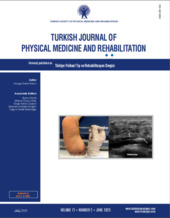Adult disability assessment in Türkiye with real-life experiences of physiatrists: A cross-sectional analytic study
2 Department of Physical Medicine and Rehabilitation, University of Health Sciences, Bursa Yüksek İhtisas Training and Research Hospital, Bursa, Türkiye
3 Department of Physical Medicine and Rehabilitation, Ankara Etlik City Hospital, Ankara, Türkiye
4 Department of Physical Medicine and Rehabilitation, İstanbul Medeniyet University Faculty of Medicine, İstanbul, Türkiye
5 Department of Physical Medicine and Rehabilitation, Tokat State Hospital, Tokat, Türkiye
6 Department of Physical Medicine and Rehabilitation, Haydarpaşa Numune Training and Research Hospital, İstanbul, Türkiye
7 Department of Physical Medicine and Rehabilitation, Ankara Bilkent City Hospital, Ankara, Türkiye
8 Department of Physical Medicine and Rehabilitation, Göztepe Prof. Dr. Süleyman Yalçın City Hospital, İstanbul, Türkiye
9 Department of Physical Medicine and Rehabilitation, Demiroglu Bilim University, İstanbul, Türkiye DOI : 10.5606/tftrd.2025.14903 Objectives: The aim of this study was to determine the workload and problems of physiatrists in disability assessment in Türkiye.
Materials and methods: A 39-question electronic survey was administered between May 2023 and October 2023 to 217 physiatrists from all geographical regions of Türkiye. The survey was comprehensive in scope, encompassing a range of inquiries pertaining to demographic characteristics, time allocation for assessment, additional payment status, comprehensive training received, knowledge and skill levels, consistency of the national guideline used for disability assessment, attitudes toward decision-making, communication with other specialists, and medico-legal issues.
Results: A total of 217 physiatrists (86 males, 131 females; mean age: 41.5±8.0 years; range, 28 to 68 years), 155 (71.4%) specialists and 62 (28.6%) academics, with a mean residency experience of 11.99±8.31 years, participated in the study. The survey results showed that disability assessment was a heavy burden and a difficult task that may involve disadvantages for physiatrists, and a significant majority reported not having received comprehensive training in disability assessment during or after residency. Additionally, only 65% felt that their knowledge and skills in disability assessment were adequate. In addition, only 13.8% of physiatrists felt that the national guideline accurately reflected an individual's level of disability, with the results highlighting inadequacies and inconsistencies in the guideline. Another striking finding was that there was disagreement among clinicians regarding the rate of impairment and the determination of full dependency.
Conclusion: Physiatrists, who play an important role in disability assessment, face several challenges in this process in Türkiye. The results of this study are expected to guide the implementation of effective and accurate disability assessment methods and provide sustainable solutions.
Keywords : Disability evaluation, knowledge, physiatry

















